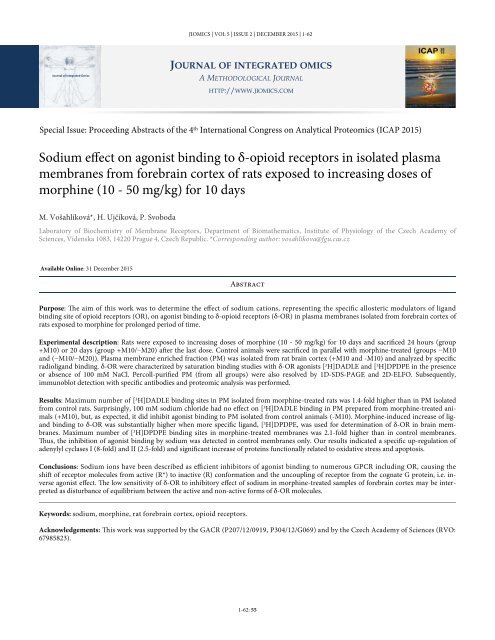JIOMICS
JIOMICS Internacional
JIOMICS Internacional
Create successful ePaper yourself
Turn your PDF publications into a flip-book with our unique Google optimized e-Paper software.
<strong>JIOMICS</strong> | VOL 5 | ISSUE 2 | DECEMBER 2015 | 1-62<br />
JOURNAL OF INTEGRATED OMICS<br />
Journal of Integrated Omics<br />
A METHODOLOGICAL JOURNAL<br />
HTTP://WWW.<strong>JIOMICS</strong>.COM<br />
Special Issue: Proceeding Abstracts of the 4 th International Congress on Analytical Proteomics (ICAP 2015)<br />
Sodium effect on agonist binding to δ-opioid receptors in isolated plasma<br />
membranes from forebrain cortex of rats exposed to increasing doses of<br />
morphine (10 - 50 mg/kg) for 10 days<br />
M. Vošahlíková*, H. Ujčíková, P. Svoboda<br />
Laboratory of Biochemistry of Membrane Receptors, Department of Biomathematics, Institute of Physiology of the Czech Academy of<br />
Sciences, Videnska 1083, 14220 Prague 4, Czech Republic. *Corresponding author: vosahlikova@fgu.cas.cz<br />
Available Online: 31 December 2015<br />
Abstract<br />
Purpose: The aim of this work was to determine the effect of sodium cations, representing the specific allosteric modulators of ligand<br />
binding site of opioid receptors (OR), on agonist binding to δ-opioid receptors (δ-OR) in plasma membranes isolated from forebrain cortex of<br />
rats exposed to morphine for prolonged period of time.<br />
Experimental description: Rats were exposed to increasing doses of morphine (10 - 50 mg/kg) for 10 days and sacrificed 24 hours (group<br />
+M10) or 20 days (group +M10/−M20) after the last dose. Control animals were sacrificed in parallel with morphine-treated (groups −M10<br />
and (−M10/−M20)). Plasma membrane enriched fraction (PM) was isolated from rat brain cortex (+M10 and -M10) and analyzed by specific<br />
radioligand binding. δ-OR were characterized by saturation binding studies with δ-OR agonists [ 3 H]DADLE and [ 3 H]DPDPE in the presence<br />
or absence of 100 mM NaCl. Percoll-purified PM (from all groups) were also resolved by 1D-SDS-PAGE and 2D-ELFO. Subsequently,<br />
immunoblot detection with specific antibodies and proteomic analysis was performed.<br />
Results: Maximum number of [ 3 H]DADLE binding sites in PM isolated from morphine-treated rats was 1.4-fold higher than in PM isolated<br />
from control rats. Surprisingly, 100 mM sodium chloride had no effect on [ 3 H]DADLE binding in PM prepared from morphine-treated animals<br />
(+M10), but, as expected, it did inhibit agonist binding to PM isolated from control animals (-M10). Morphine-induced increase of ligand<br />
binding to δ-OR was substantially higher when more specific ligand, [ 3 H]DPDPE, was used for determination of δ-OR in brain membranes.<br />
Maximum number of [ 3 H]DPDPE binding sites in morphine-treated membranes was 2.1-fold higher than in control membranes.<br />
Thus, the inhibition of agonist binding by sodium was detected in control membranes only. Our results indicated a specific up-regulation of<br />
adenylyl cyclases I (8-fold) and II (2.5-fold) and significant increase of proteins functionally related to oxidative stress and apoptosis.<br />
Conclusions: Sodium ions have been described as efficient inhibitors of agonist binding to numerous GPCR including OR, causing the<br />
shift of receptor molecules from active (R*) to inactive (R) conformation and the uncoupling of receptor from the cognate G protein, i.e. inverse<br />
agonist effect. The low sensitivity of δ-OR to inhibitory effect of sodium in morphine-treated samples of forebrain cortex may be interpreted<br />
as disturbance of equilibrium between the active and non-active forms of δ-OR molecules.<br />
Keywords: sodium, morphine, rat forebrain cortex, opioid receptors.<br />
Acknowledgements: This work was supported by the GACR (P207/12/0919, P304/12/G069) and by the Czech Academy of Sciences (RVO:<br />
67985823).<br />
1-62: 55


